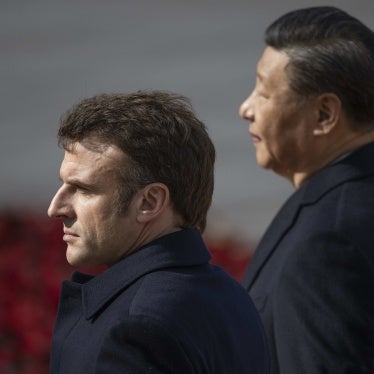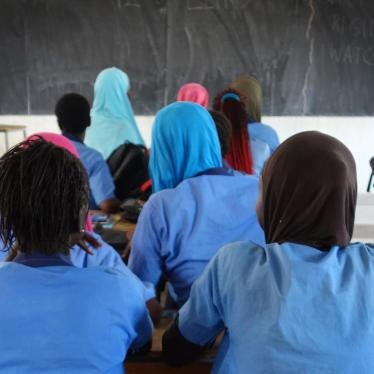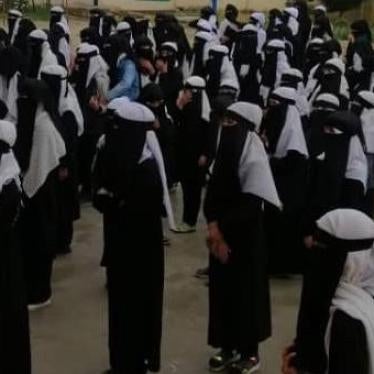Testimony of John Sifton,
Asia Advocacy Director,
Human Rights Watch:
Tom Lantos Human Rights Commission
Hearing of May 23, 2012
“Human Rights in Indonesia”
Mr. Chairman, I would like to thank you for inviting me to testify today, and thank the committee for focusing on Indonesia’s human rights record, which too often today does not receive the attention it deserves.
Indonesia has seen enormous changes over the last 15 years. Human Rights Watch is aware of the general and widespread improvements that have occurred with respect to basic civil and political rights, particularly the flourishing civil society and media.
The country’s current human rights situation, however, cannot continue to be gauged in comparison with the country’s past. Genuine reforms should be recognized, but the Indonesian government should be judged by the same set of standards as any other government and criticized objectively for failing to meet its human rights obligations. To do otherwise would be to condemn the people of Indonesia to a lowered standard of rights protections.
Human Rights Watch wishes to focus on four particular areas of human rights concern: First, the situation in Papua and related issues of freedom of expression. Second, the issue of military impunity for rights abuses. Third, the worsening persecution of religious minorities. And last, issues involving migrants and asylum seekers.
Free Expression in Papua and Elsewhere
Human Rights Watch remains very concerned with the situation in Papua and West Papua, on the eastern end of the Indonesian archipelago, where Indonesian military and police forces exercise extensive control over the ethnic Papuan population, and often harass and bring politically motivated prosecutions against Papuans who are believed to be involved in pro-independence groups.
In October 2011, a pro-independence rally in Papua was dispersed violently by Indonesian security forces—three protesters were killed and many more injured. Several were severely beaten. Six months later, a court in Papua convicted five men for statements made at the event—Selpius Bobii, a social media activist; August Sananay Kraar, a civil servant; Dominikus Sorabut, a filmmaker; Edison Waromi, a former political prisoner; and Forkorus Yaboisembut, a Papuan tribal leader—and sentenced them to three years in prison.
Forkorus Yaboisembut had visited Washington, D.C. in 2010 and met with members of Congress and State Department officials. He is in his 50s and likely weighs less than 100 pounds, but that did not stop the security forces from beating him very badly at the rally.
An apparent government crackdown on independence activists from May to August 2012 resulted in an upsurge in violence in Papua. Forty-seven reported violent incidents in this period left 18 people dead, including an Indonesian soldier involved in a traffic accident, and dozens of wounded, including a German tourist. On June 14, 2012, police shot and killed the deputy chairman Mako Tabuni of National Committee for West Papua (Komite Nasional Papua Barat or KNPB), a militant Papuan independence group, triggering riots in the Jayapura neighborhood of Wamena, over perceptions that Tabuni was the victim of an extrajudicial execution. Papua police alleged that Tabuni was involved in numerous shootings, but have not offered clear evidence to support the claim.
Violence broke out in Papua again very recently, on May 1, 2013, the fiftieth anniversary of the day when Papuan territory was ceded to Indonesia by the United Nations, in 1963. Indonesian police reportedly shot and killed two protesters in the city of Sorong the day before the protests, and at least 20 protesters were arrested in the cities of Biak and Timika on the day of the protests, most for raising the pro-independence Morning Star flag.
The UN High Commissioner for Human Rights, Navi Pillay, condemned the arrests in a statement, and noted that since May 2012, her office had received 26 reports concerning alleged human rights violations in Papua, including 45 killings and cases of torture, many linked to security officials. And as Human Rights Watch has done, she criticized the government’s failure to investigate and prosecute security force personnel implicated in abuse.
Also in May 2012, more than a dozen UN member countries raised tough questions during Indonesia’s Universal Periodic Review at the UN Human Rights Council about human rights problems in Papua including the ongoing impunity for abuses by security forces, restrictions on the rights to freedom of expression, and excessive restrictions and surveillance of foreign journalists and human rights researchers. But Indonesia rejected all of the Papua-related recommendations, denying the country has political prisoners or a problem of impunity in Papua, and claiming without basis that “national journalists” could travel freely in the region.
Frank La Rue, the UN Special Rapporteur on freedom of opinion and expression, visited Indonesia in January but was denied permission to visit Papua, highlighting Indonesia’s failure to act in compliance with the Human Rights Council’s recommendations.
The committee should also consider the case of Filep Karma, another Papuan activist imprisoned for peacefully advocating Papua’s independence from Indonesia. Almost nine years ago, on December 1, 2004, Karma helped organize a ceremony to mark the anniversary of Papua’s independence from Dutch colonial rule. The event was attended by hundreds of Papuan students who shouted “Freedom!” and waved the Papuan “Morning Star” flag, which is illegal under Indonesian law. When protesters tried to raise the flag, security forces disbanded the rally. Karma and others were arrested, and the following year he was found guilty of treason for organizing the event and sentenced to 15 years’ imprisonment.
No allegations about violence have ever been made against Karma; he has spoken extensively against the use of violence in protesting the Indonesian government. “We want to engage in a dignified dialogue with the Indonesian government,” he has said. “A dialogue between two peoples with dignity, and dignity means we have no use of violence.”
In November 2011, the UN Working Group on Arbitrary Detention issued an opinion that the Indonesian government was violating international law by detaining Karma and called for his immediate and unconditional release.
Indonesia’s jailing of peaceful protesters is not limited to Papua. Several dozen Moluccan protesters—persons who support an independent Moluccan republic—were arrested in connection with a June 29, 2007 protest during National Family Day festivities at a stadium on Ambon island. During the event, which was attended by President Susilo Bambang Yudhoyono, 28 Moluccan independence groups members entered the stadium and began a traditional dance called the cakalele, and then unfurled the banned flag of the Republic of the South Moluccas. The protest was led by a Moluccan school teacher named Johan Teterisa. A tribal chief named Ferdinand Waas helped organize the protest. The dancers, mostly young men who came from Haruku Island, east of Ambon, embarrassed President Yudhoyono in front of foreign guests: when he spoke after the dance he told the audience that there is “no tolerance” in Indonesia for separatism. Most of the protesters were immediately arrested during the event, and Human Rights Watch later documented in a 2010 report how many of them were severely tortured by Indonesian authorities after arrest. Most were then prosecuted for treason and sentenced to terms in prison in a range of about 8 to 10 years. Seven of the original protesters today suffer from severe health problems related to their torture and beatings after arrest.
Military Impunity
Indonesia’s security forces continue to commit serious abuses with almost complete impunity. The military justice system has a poor prosecution record in human rights cases, and there is no civilian jurisdiction over soldiers, even for serious rights abuses.
These failings are highlighted in an incident last year in Papua: On June 6, 2012 over 300 soldiers from the 756th Battalion went on a rampage in the Papuan village of Wamena as a reprisal for an incident in which villagers beat to death a soldier involved in a fatal traffic accident. Soldiers randomly fired their weapons into shopping areas, burned down 87 houses, stabbed 13 villagers, and killed a native Papuan civil servant. Although military officials on June 12 apologized for the incident and promised compensation, victims said military investigators failed to question them about the incident. They said rather than paying any compensation, the military has limited its response to the violence to a traditional Papuan “stone-burning” ceremony and declared the case closed. No one is known to have been prosecuted for the violence.
Concerns about impunity of the security forces resurfaced this year in Java, Indonesia’s most populous island. On March 23, 11 members of the Special Forces Command (Komando Pasukan Khusus or Kopassus), were arrested for breaking into the Cebongan prison in Yogyakarta, central Java, and murdering four detainees in their cell. Investigators said the motive for the murders was revenge for a killing, three days earlier, of Kopassus member Heru Santoso, for which the four detainees had been arrested. Santoso and the 11 Kopassus suspects all served with Kopassus Group II in Kartasura, about a two-hour drive from Yogyakarta.
Investigators say that the Kopassus suspects, disguised with ski masks and carrying AK-47 assault rifles, forced their way into the prison, beat two prison guards who subsequently required hospitalization, and executed the four detainees. When leaving after the 15-minute attack, the assailants seized the prison’s closed circuit television recordings.
On March 24, the day after the attack, the military commander for Central Java, Maj. Gen. Hardiono Saroso, whose authority extends to Kopassus Group II, rejected the allegations that Kopassus personnel had perpetrated the prison murders. But nine days later, on April 2, army commander Gen. Pramono Edhie Wibowo indicated that Kopassus members had been involved in the prison attack. On April 4, an army investigating team revealed that the nine Kopassus soldiers had perpetrated the attack, and on April 6, the armed forces announced that Saroso, the Java commander, had been dismissed from his post in connection with the prison murders.
At the same time, senior military and government officials have publicly defended the suspects and downplayed the severity of the crime. On April 4, army investigator Brig. Gen. Untung Yudhoyono repeatedly described the four slain detainees as “thugs” and said their murders were an expression of Kopassus loyalty. On April 12, Defense Minister Purnomo Yusgiantoro publicly denied that the prison murders were a human rights violation on the basis that the killings were “spontaneous [and] unorganized.” Kopassus commander Maj. Gen. Agus Sutomo on April 16 insisted that the prison raid was an act of mere “insubordination” rather than a human rights issue.
Human Rights Watch is concerned that the Kopassus suspects will not be prosecuted to the full extent of the law. Under Indonesian law, military personnel cannot be tried in civilian courts, with only a few rarely invoked exceptions. The military justice system has jurisdiction to prosecute crimes committed by soldiers, but it has a very poor prosecutorial record. The military criminal code does not contain a crime of torture, among other shortcomings. While a 2000 Law on Human Rights Courts authorizes human rights courts to assert jurisdiction over cases involving allegations that members of the military committed serious human rights abuses, at present it applies only to allegations of genocide and crimes against humanity, and not to the broad spectrum of conduct that constitutes human rights abuse.
During the UN Universal Periodic Reviews of Indonesia’s human rights record in 2007 and 2012, the Indonesian government committed to reforming the military tribunal system, that promised reform including adding torture and other acts of violence to the military criminal code of prosecutable offenses and ensuring the definition of those offenses are consistent. However, to date the government has not added those offenses to the military criminal code.
Kopassus’ record of human rights violations and its failure to hold the abusers accountable spans its operations across Indonesia, beginning in the 1960s in Java and extending to East Timor, Aceh, and Papua in the decades since. The well-documented East Timor abuses prompted the United States to impose a ban on military contact with the elite forces in 1999. In 2010, the US lifted the ban. Human Rights Watch and domestic human rights organizations criticized the ban on the basis that the Indonesian military, and Kopassus in particular, had failed to demonstrate a genuine commitment to accountability for serious human rights abuses.
Serious abuses by Indonesian forces and the failure to fully prosecute and punish military personnel extends far beyond Kopassus. In a number of cases over the past decade, the Indonesian military justice system has dispensed extremely lenient sentences to soldiers convicted of serious human rights abuses against civilians:
- On May 30, 2010, several Indonesian soldiers detained two Papuan farmers, Tunaliwor Kiwo and Telangga Gire, at a military checkpoint in Tingginambut, Puncak Jaya, in Papua. The soldiers tortured them, demanding the farmers lead them to alleged weapons caches in their village. A graphic video documented the soldiers perpetrating sexual violence against Kiwo and threatening to kill Gire. The military tribunal convicted only three soldiers involved in the torture on charges of “insubordination” and handed down prison sentences of between eight and ten months.
- Video footage documented abuses perpetrated on March 17, 2010, by a 12-soldier checkpoint unit of the army’s 753rd Battalion, led by Lt. Cosmos in Papua’s Kolome village also in Puncak Jaya. The video documented the unit interrogating Papuan villagers, beating them with their helmets and kicking them. Lt. Col. Adil Karo-Karo, a military judge, criticized the soldier who recorded the abuse, saying “You’re stupid. Knowing how sensitive it was, why did you keep recording it anyway?” On November 12, 2010, the Jayapura military tribunal found Cosmos and three soldiers under his command guilty of “insubordination.” Cosmos was sentenced to seven months in prison while the three privates received sentences of five months each.
- In June 2008, a military court found 13 navy personnel guilty of opening fire on a group of civilians in Pasuruan, East Java, killing four civilians and injuring several others in May 2007. The shootings were in connection with a land dispute involving a business that had hired the soldiers to provide security. Although the relevant charges carried a maximum penalty of 15 years in prison, the soldiers received prison terms ranging from 18 months to 36 months, and dismissal from the military.
- Three soldiers were convicted in July 2005 of torturing a civilian in Bogor, West Java, on the suspicion that he had stolen a pair of sandals. According to a forensic report, the civilian died the following day from injuries sustained as a result of the torture. A military court convicted the soldiers of assault and sentenced them to prison terms ranging between six weeks to 18 months.
- Three soldiers convicted in July 2003 for raping four women in North Aceh, subject to up to 12 years' imprisonment, were given prison sentences ranging from two years and six months to three years and six months and dismissal from the military.
Freedom of Religion
In February, Human Rights Watch published a comprehensive report on the frequent and occasionally deadly attacks on religious minorities in Indonesia. The report describes a worsening environment for religious minorities across Indonesia. Islamist militants are increasingly mobilizing in mobs to attack religious minorities—with almost complete impunity. Light prison terms imposed on those prosecuted send a message of official tolerance for such mob violence. Dozens of regulations, including ministerial decrees on building houses of worship, continue to foster discrimination and intolerance.
Throughout 2012, dozens of minority Christian congregations, including GKI Yasmin church in Bogor and HKBP Filadelfia church in the Jakarta suburb of Bekasi, reported that local government officials arbitrarily refused to issue them permits required under a 2006 decree on building houses of worship. Both churches had already won Supreme Court decisions to build such structures. Senior government officials, including Religious Affairs Minister Suryadharma Ali and Home Affairs Minister Gamawan Fauzi, continued to justify restrictions on religious freedom in the name of public order. They both offered affected minorities “relocation” rather than legal protection of their rights.
Suryadharma Ali has himself inflamed tensions by making highly discriminatory remarks about the Ahmadiyah and Shia religious communities, suggesting that both are heretical. In September 2012, he stated that the “solution” to religious intolerance of Ahmadiyah and Shia was their conversion to the Sunni Islam that most Indonesians follow. That same month, President Yudhoyono called for the development of an international instrument to prosecute “religious blasphemy,” which could be used to restrict free expression and the religious freedom of minorities.
According to Indonesia’s Setara Institute, which monitors religious freedom, attacks on religious communities increased from 216 in 2010 to 244 in 2011 to 264 attacks in 2012. These figures suggest the situation is worsening.
Some of the worst recent attacks involved a Shia village in Sampang regency on Madura Island. On December 29, 2011, Sunni militants burned down houses and a madrasa, an Islamic school, causing around 500 Shia residents to flee. Police arrested and charged only one of the militants for the arson attack. On August 26, 2012, at the end of Eid, the holiday following the end of Ramadan, hundreds of Sunni militants again attacked the same Shia village and burned down around 50 Shia houses, killing one man and seriously injuring another. Several police officers at the scene failed to intervene to stop the attack—video footage of the attack shows police standing around while Sunni militants attack. Many of the Shia attacked remain displaced from their homes.
In November 2012, Acehnese villagers attacked a Muslim sect in Bireuen, Aceh, targeting the house of a Muslim teacher, Tengku Aiyub Syakuban, who clerics accused of disseminating “heretical teachings.” Hundreds of villagers were involved in the attack and set fire to Syakuban and his student Muntasir, both of whom were burned to death. One of the attackers also somehow died in the violence. No one was arrested.
One of the most troubling recent attacks occurred on February 6, 2011, in Cikeusik, a village in western Java, when a crowd of around 1,500 Islamist militants armed with stones, sticks, and machetes attacked a small gathering of two dozen Ahmadiyah. In a video of the attack, the mob is shouting, “You are infidels! You are heretics!” Local police can be seen but many leave when the crowd begins descending on the Ahmadiyah. The video shows the crowd viciously kicking and beating several men with large pieces of wood. By the time the attack is over, three men are bludgeoned to death. It is a disgusting sight, to see a mob beat human beings to death. But it is doubly troubling to realize that police were on the scene and left, making them complicit in the crime.
But the authorities are not only responsible for acts of omission. Officials have been directly involved in the persecution of religious minorities.
In March 2012, a court in Central Java sentenced Andreas Guntur, the leader of the spiritual group Amanat Keagungan Ilahi, to four years’ imprisonment on charges of blasphemy on the basis of allegedly improper teachings of certain verses of the Quran.
In June 2012, a West Sumatra court sentenced Alexander An, an administrator of the “Minang Atheist” Facebook group, to 30 months in prison and a fine of 100 million rupiah (US$11,000) for “inciting public unrest” via Facebook postings espousing atheism.
In July 2012, an East Java district court sentenced Shia cleric Tajul Muluk to two years’ imprisonment for blasphemy against Islam. The East Java high court later increased his sentence to four years and two months for causing “riots” in August.
In October 2010 a preacher named Antonius Richmond Bawengan from Jakarta was arrested and prosecuted for handing out controversial leaflets that angered local Muslims in Central Java. In 2011, he was convicted of blasphemy and sentenced to five years’ in prison.
In 2010 a local court in Sumatra convicted two Baha’i members, Syahroni and Iwan Purwanto, of “trying to convert” Muslim children to the Baha’i faith, which is not recognized under Indonesian law. The charge was not supported by clear allegations. Both men were sentenced to five years in prison.
There are also a panoply of discriminatory laws and policies in Indonesia that make life extraordinarily difficult for religious minorities. A Christian group that wants to build a new church is tied up with regulations that are often enforced at the whim of local authorities. A Shi’a woman will be told she cannot identify herself as “Muslim” on her government ID card, because the Shi’a faith is deemed heretical. A Baha’i couple will be forced to say they are Muslim in order to get a marriage certificate; if they refuse, their marriage cannot be recognized, and their children will be considered fatherless on their birth certificates. And atheists can be punished by hard jail time.
Migrants and Asylum Seekers
More than four million Indonesian women work abroad in Malaysia, Singapore, and the Middle East as live-in domestic workers. These women often encounter a range of abuses, including labor exploitation, psychological, physical, and sexual abuse, and situations of forced labor and slavery-like conditions. The Indonesian government has become an increasingly vocal advocate for its workers abroad, successfully negotiating the pardon of 22 Indonesian women on Saudi Arabia’s death row, calling for improved labor protections, and ratifying the Migrant Workers Convention.
However, Indonesia has consistently failed to rein in abusive recruitment agencies that send workers abroad. Many agencies charge workers high fees that leave them heavily indebted and give them deceptive or incomplete information about their work conditions. Revisions to its migration law remain pending.
Within Indonesia, an important draft law extending key protections to domestic workers has languished in parliament. The country’s labor law excludes all domestic workers from the basic labor rights afforded to formal workers, such as a minimum wage, overtime pay, limits to hours of work, a weekly rest day, and vacation. Hundreds of thousands of girls, some as young as 11, are employed as domestic workers. Many work 14 to 18-hour days, seven days a week, with no day off. Many employers forbid child domestic workers from leaving the house where they work and pay little or none of their salaries. In the worst cases, girls are physically, psychologically, and sexually abused by their employers or their employers’ family members.
Indonesia detains and mistreats thousands of asylum seekers, including children, from Sri Lanka, Afghanistan, Burma, and elsewhere. Asylum seekers face detention, abuses in custody, limited access to education, and have little or no basic assistance.
In February 2012, an Afghan asylum seeker died from injuries allegedly inflicted by guards at the Pontianak Immigration Detention Center.
Indonesia is not party to the 1951 Refugee Convention, and does not provide most migrants opportunities to obtain legal status, such as to seek asylum. Many migrants consider traveling on to Australia on boats arranged by smugglers a viable option, despite the risks of drowning in the dangerous sea crossing.
Human Rights Watch is becoming increasingly concerned with the plight of child migrants and asylum seekers in particular. Our research has found that hundreds of unaccompanied children—again, people fleeing war, violence, and poverty in countries as far away as Afghanistan, Sri Lanka, and Burma—are detained each year in Indonesia and held in terrible and violent conditions, often for months or even years, with no access to education, with their fundamental right to seek asylum ignored. We will be issuing a report on this subject this summer.
Thank you for allowing me to testify today.








